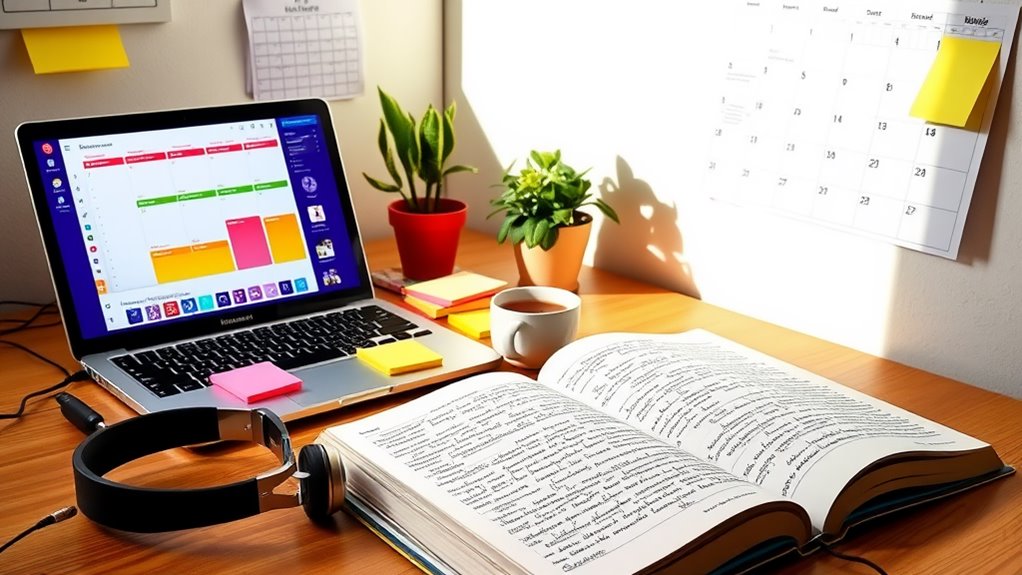Study Routines for Students That Guarantee Better Grades!
To improve your grades, establish a structured study routine. Start by integrating time management techniques like the Pomodoro Technique for focused intervals. Use active learning strategies such as peer teaching or self-quizzing to enhance retention. Create a distraction-free environment by designating a specific study area and minimizing clutter. Regular review sessions with spaced repetition can solidify your understanding and identify knowledge gaps. This structured approach not only boosts academic performance but also alleviates anxiety surrounding exams. For insights on specific techniques and their benefits, you might find the next sections particularly enlightening.
Key Takeaways
- Establish a structured routine to enhance academic performance and reduce procrastination through consistent study schedules.
- Utilize time management techniques like the Pomodoro Technique for focused study sessions and effective breaks.
- Engage in active learning strategies such as active recall and peer teaching to reinforce understanding and retention of material.
- Create a distraction-free environment by organizing your study space and minimizing interruptions for improved concentration.
- Incorporate regular review and self-assessment practices, including spaced repetition and self-quizzing, to solidify knowledge and identify gaps.
Importance of a Structured Routine
Many students find that having a structured routine can greatly enhance their academic performance and overall well-being. Establishing a consistent study schedule allows you to allocate specific times for learning, thereby reducing procrastination and improving focus. The benefits of routines extend beyond mere time management; they foster a sense of discipline that can permeate all areas of your life.
When you implement consistency in studying, your brain becomes accustomed to absorbing information during designated periods. This regularity not only aids memory retention but also minimizes anxiety associated with last-minute cramming. By creating a predictable environment, you empower yourself to dive deeper into subjects, ultimately leading to mastery.
Furthermore, a structured routine can help you identify and eliminate distractions. Knowing what to expect each day allows you to prepare mentally and physically, enhancing your capacity to engage fully with your studies.
This approach also promotes a balanced lifestyle, as you can integrate time for relaxation and self-care alongside your academic commitments.
In essence, embracing a structured routine equips you with the tools necessary for sustained success, paving the way for improved grades and a more fulfilling educational experience.
Time Management Techniques
Effective time management techniques are essential for students aiming to maximize their productivity and minimize stress. By implementing structured methods, you can tackle academic challenges more efficiently.
Two powerful strategies to take into account are the Pomodoro Technique and the Prioritization Matrix.
-
Pomodoro Technique: This involves working in focused intervals of 25 minutes, followed by a 5-minute break. This method enhances concentration and prevents burnout, allowing you to maintain high levels of productivity.
-
Prioritization Matrix: This tool helps you categorize tasks based on urgency and importance, enabling you to focus on what truly matters. By distinguishing between tasks that require immediate attention and those that can wait, you can allocate your time more effectively.
-
Time Blocking: This technique involves scheduling specific blocks of time for different activities, ensuring you dedicate enough attention to significant subjects while also making time for breaks and personal activities.
Active Learning Strategies
While managing your time efficiently lays the groundwork for academic success, incorporating active learning strategies can greatly enhance your understanding and retention of material. Active learning engages you in the process, transforming passive absorption into dynamic interaction.
One of the most effective techniques is active recall. Instead of merely reviewing notes, try to retrieve information from memory. This method strengthens neural connections, making it easier to recall information during exams.
Another powerful strategy is peer teaching. When you explain concepts to a classmate, you reinforce your own understanding and identify gaps in your knowledge. Teaching others not only solidifies your mastery but also fosters collaborative learning, which can provide different perspectives and insights.
Incorporating these strategies into your study routine can lead to deeper comprehension and improved retention. As you practice active recall and engage in peer teaching, you’ll find that your confidence grows along with your grades.
Creating a Distraction-Free Environment
Creating a distraction-free environment is vital for maximizing your study efficiency and focus. When you eliminate interruptions, you can explore deeper into your material, enhancing retention and understanding.
A well-structured study space is essential for this process. Here are a few strategies to help you achieve that:
-
Designate a Specific Study Area: Choose a location solely for studying. This helps your brain associate that space with focused work, increasing productivity.
-
Implement Noise Control****: Whether it’s using noise-canceling headphones, soft music, or white noise, controlling sound can notably reduce distractions and help you concentrate better.
-
Minimize Visual Clutter: Keep your study area organized. A clean, uncluttered space reduces mental distractions, allowing you to focus on the task at hand.
Regular Review and Self-Assessment
Regularly reviewing your material and conducting self-evaluations are essential steps in reinforcing what you’ve learned. By integrating spaced repetition into your study routine, you can enhance long-term retention of information. This technique involves revisiting material at increasing intervals, which helps to combat the forgetting curve.
Incorporating self-quizzing benefits into your review sessions can greatly boost your understanding and recall. When you test yourself, you actively engage with the content, making it easier to identify gaps in your knowledge. This not only reinforces your learning but also builds your confidence, which is imperative for exam performance.
Combine these methods by scheduling regular review sessions where you self-quiz on previously studied material. Aim for a structured approach, such as setting aside specific days for different subjects. By consistently evaluating your progress, you can adapt your study strategies to focus on areas that require more attention.
Ultimately, the combination of spaced repetition and self-evaluation creates an effective feedback loop, allowing you to master your subjects more efficiently. Embrace these practices, and you’ll likely find yourself achieving the grades you desire.
Frequently Asked Questions
How Can I Stay Motivated to Stick to My Study Routine?
To stay motivated, you should focus on goal setting and form accountability partnerships. Clearly defined goals provide direction, while accountability partners encourage consistency and support, helping you remain committed to your study routine and achieve mastery.
What Tools Can Help Me Track My Study Progress Effectively?
Studies show that 70% of students who track their progress improve retention. Utilizing study apps and progress charts can help you visualize your advancements, keeping you focused on your goals and enhancing your overall learning experience.
Are There Specific Study Routines for Different Subjects?
Yes, there are subject-specific strategies that enhance learning. For math, practice problems are key; for literature, summarizing themes works well. Employing effective study techniques tailored to each subject can greatly boost your understanding and retention.
How Do I Deal With Burnout During Intense Study Sessions?
Burnout can creep up unexpectedly during study marathons. To combat this, incorporate study breaks regularly, prioritizing your mental health. Short pauses help recharge your focus, ultimately enhancing your efficiency and retention. Don’t push through—rest is essential.
Can Study Groups Enhance My Learning and Grades?
Yes, study groups can enhance your learning and grades. Effective group dynamics foster collaborative learning, allowing you to share insights and tackle complex concepts together. Engaging with peers often deepens understanding and retention of material.





